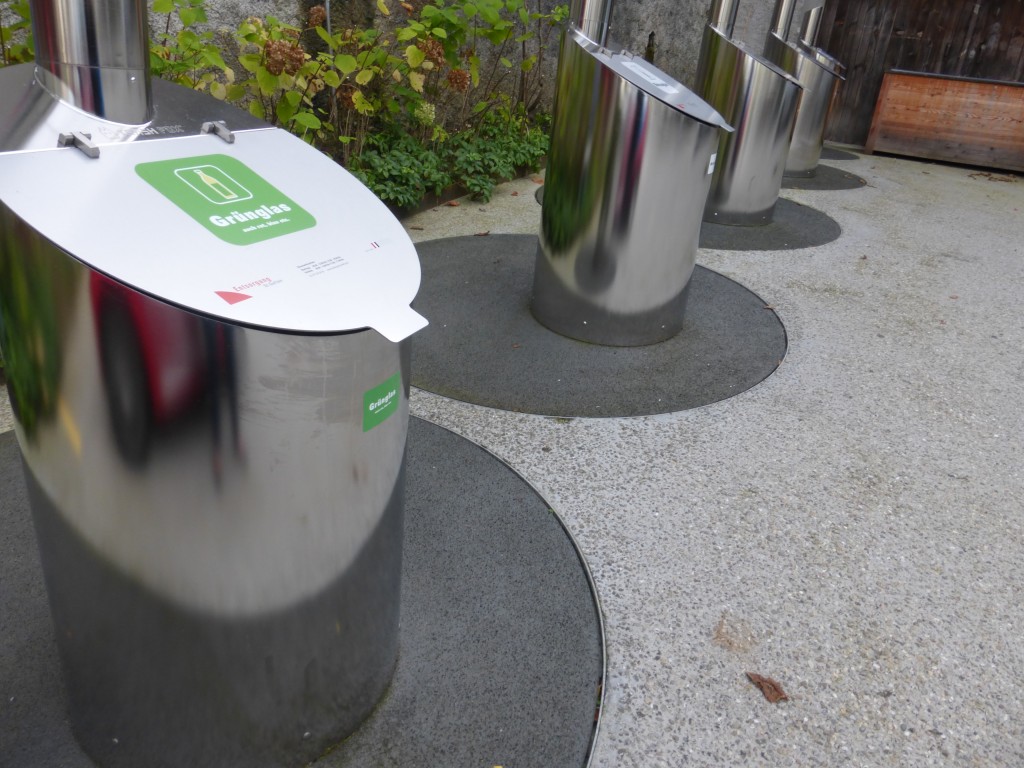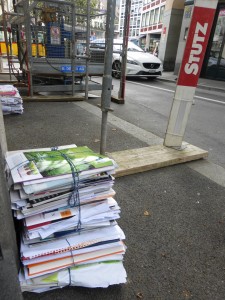
Go green! Save the Earth! Reduce, reuse, recycle!
Switzerland is an environmentalist’s dream. With its strict protection standards, it took the No. 1 position in this year’s Environmental Performance Index. No wonder, then, this place is known for its cleanliness and picturesque scenery.
Promoting green initiatives throughout the country, every day is Earth Day in Switzerland.
Legally protecting the environment
Leave it to me to break the Swiss environmental code within the first two weeks of moving back.
Unlike the States, recycling in Switzerland is a strict standardized process. I do miss the convenience of throwing plastics, glass, paper, cardboard and aluminum into one bin and carrying it out to the street for pickup every other week as was the case in Newport News.
These strict Swiss protocols were unbeknownst to me at the time of my indiscretion as I casually placed my paper and cardboard waste on the street for pickup. After my loosely-tied bundle remained on the curb long after the scheduled pickup, I not-so-discreetly received an instructional flyer on the proper method of disposing of each sort of recyclable. No loose ties, paper and cardboard separated, and much more.
Fines for littering and disposing of waste in other incorrect ways can be met with hefty fines and police persistence. We’ve even been told how inspectors from the Association of Swiss Recycling Organisations, an umbrella group of several government entities that oversee the various products of recycling, inspect garbage for any perpetrators by looking for any trashed documents that contain the name and address of the wrongdoer.
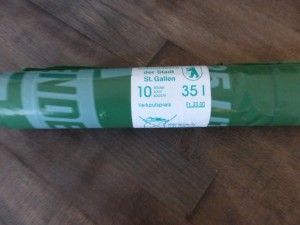
Other than the fines, the Swiss have ingeniously devised another plan to encourage adherence to these strict policies: tax. Most cantons will only pick up trash (of the non-recyclable sort) in certain bags that you buy at the grocery store. Instead of paying a government service bi-monthly, as was our experience in Virginia, you pay the tax when you purchase these specialty trash bags at the supermarket of your choice.
How does recycling in Switzerland work?
In the well-known Swiss style of pragmatism, each piece of waste has its designated place.
Recycling Drop-Off Points
Throughout any town, you can find recycling drop-off points. Large silver cans above ground have long drops to collection bins beneath ground. Each cylinder is clearly labeled for white glass, green glass, brown glass, aluminum/metal and shopping bags. Just drop your recyclable in the appropriate bin and off you go.
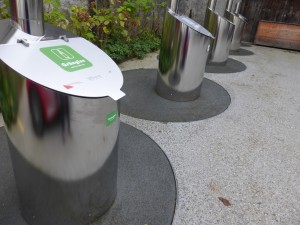
Street Collection
My handy recycling flyer hangs on my office bulletin board. It gives me the schedule of when the collection truck will come by for my bundled cardboard or paper (once per month on different dates), trash in my specially-purchased bag from the supermarket (every Tuesday and Friday morning), and my large metal items, such as old pots and pans (twice per year).
The handout also shows me how the cardboard should be broken down and bundled tight with a thin string. It provides several recycling tips and information for local agencies I can contact for further questions, including the organizations that accept old clothes and furniture and more hazardous materials, like oil and corrosives.
Supermarkets and food vendors
Along with selling the specialty bags for your almost non-existent trash items after recycling, you also return PET bottles (think soda bottles and other clear plastics) and opaque plastics (think shampoo containers and milk jugs) to bins inside most grocery stores. Beside these bins, you can also recycle dead electronic (not car, those go to specific centers) batteries and some plugs.
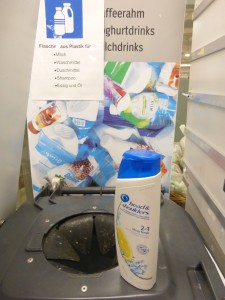
At fairs, vendors typically have a deposit for a bottle. So, when you buy a glass bottle of beer or plastic bottle of soda, you’re also given a token. If you bring that token back with your empty bottle to the vendor, you are usually given a 2-Francs deposit in return.
Compost piles
Many small communities share a compost pile where you can dispose of food scraps that are in turn used in the communal garden plots. Even in larger cities where communal garden plots aren’t as popular, you can turn in food scraps to city collection bins for compost.
How are you protecting Mother Earth?
For a small country, recycling in Switzerland is certainly doing (more than) its share to help protect and promote the environment.
How do you pitch in with saving the planet? What do you think of the Swiss’ commitment to environmental protection?

